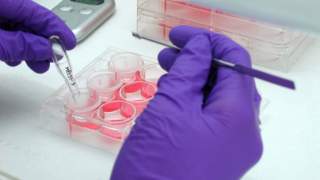
Help us end animal testing for good
The failure of animal testing in the development of treatments and cures for major diseases including Parkinson’s, Alzheimer’s, rheumatoid arthritis, HIV/AIDS and respiratory tract diseases is the subject of a new scientific paper funded by Cruelty Free International and co-authored by a former member of our science team, Dr Jarrod Bailey.
The paper, published in the journal Alternatives to Laboratory Animals, illustrates how the continued reliance on animal testing has hampered scientific progress, when “non-animal new approach methodologies are proving more predictive than animals”.
Research in the EU into respiratory tract, nervous system, immune system and musculoskeletal conditions uses a combined total of over two million animals per year, yet, the paper explains, there remains very few new effective medicines to either prevent or cure these diseases because of “insurmountable species differences”.
This failure of animal test results to translate to humans is at least partially responsible for the lack of safe, effective and affordable medicines for those who need them. 92% of potential drugs currently fail in human clinical trials, mostly because they prove unsafe or ineffective in humans. This is despite promising results from extensive preclinical tests (including animal tests).
The authors argue that, through “a paradigm shift in biomedical research”, innovative non-animal methods “such as in vitro systems, in silico models, machine learning (ML) and artificial intelligence (AI)” could overcome the problem by offering “a more predictive, human-relevant approach to understanding human diseases.”
Our Director of Science and Regulatory Affairs, Dr Emma Grange, said: “We all know about the cruelty involved in testing on animals, but it’s becoming more and more apparent that these tests are not scientifically justified. This paper adds to the growing body of evidence that animal tests are getting in the way of progress and preventing the development of new treatments and cures.”
Sign up to receive updates on Cruelty Free International's work, campaigns and lobbying, and ways that you can become part of our community.
